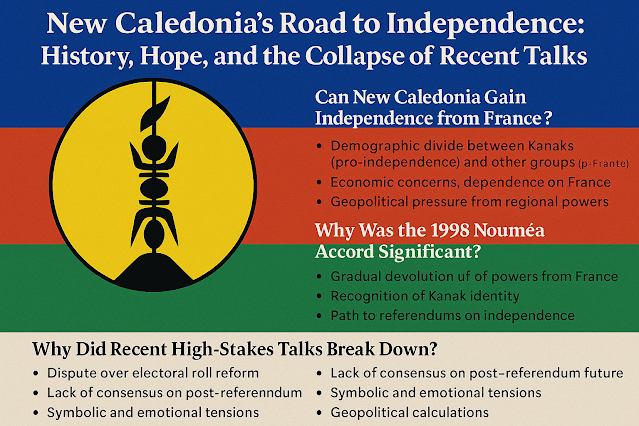
This article explores the possibility of New Caledonia gaining independence, the significance of the Nouméa Accord, and the reasons behind the recent diplomatic deadlock.
Can New Caledonia Gain Independence from France?
In principle, yes—New Caledonia can gain independence from France, but the road is steep and politically fractured. The territory has already held three referendums under the Nouméa Accord (2018, 2020, and 2021), with the majority voting to remain part of France. However, the last referendum, in 2021, was boycotted by the pro-independence Kanak population, making its legitimacy deeply contested.
Key Factors Influencing Independence:
- Demographic Divide: The indigenous Kanak people, who largely support independence, make up less than half the population. European settlers (Caldoche), Polynesians, and other ethnic groups tend to favor remaining with France.
- Economic Concerns: New Caledonia is economically dependent on France, especially in sectors like education, health, and public service funding. Nickel mining is a major industry, but it has not provided enough economic autonomy.
- Geopolitical Pressure: France seeks to maintain influence in the Indo-Pacific, while countries like Australia and China monitor developments closely.
In short, while legal and procedural paths to independence exist, they are heavily influenced by internal divisions and external strategic interests.
Why Was the 1998 Nouméa Accord Significant?
The Nouméa Accord was a turning point in New Caledonia's political evolution. Signed on May 5, 1998, between pro-independence Kanak leaders, loyalist parties, and the French government, it aimed to resolve decades of tension—including violent conflict in the 1980s.
Key Features of the Accord:
- Gradual Devolution of Powers: It promised the transfer of certain powers from France to New Caledonia, including education, health, labor laws, and external trade.
- Recognition of Kanak Identity: The Accord recognized the Kanak people’s unique culture, history, and identity, calling for reconciliation and equality.
- Path to Referendums: Most importantly, it scheduled a series of referendums that would allow the population to vote on full independence.
The Nouméa Accord was more than a political deal; it was a symbol of hope and healing, designed to balance the aspirations of both the indigenous and settler populations.
Why Did Recent High-Stakes Talks Break Down?
In 2024 and 2025, attempts by the French government to negotiate a new status for New Caledonia collapsed, primarily due to disagreements over electoral reforms and independence timelines.
Main Reasons for the Breakdown:
1. Electoral Roll Dispute:
- France proposed changing the voting list for provincial elections, allowing recent settlers to vote.
- Kanak leaders saw this as a violation of the Nouméa Accord, which limited voting rights to long-term residents to protect Kanak political influence.
- Critics called this move “recolonization through demography.”
2. Lack of Consensus on Post-Referendum Future:
- While France pushed for a “third way” between full independence and the current status, pro-independence groups accused the state of imposing decisions without genuine consultation.
3. Symbolic and Emotional Tensions:
- For many Kanaks, the 2021 referendum (held during a COVID-19 mourning period) was illegitimate.
- Talks broke down in an atmosphere of mistrust, resentment, and unresolved historical trauma.
4. Geopolitical Calculations:
- France wants to retain a foothold in the Pacific.
- Pro-independence leaders argue this turns New Caledonia into a pawn in global power politics.
Conclusion: A Nation in Limbo
New Caledonia stands at a critical crossroads. The possibility of independence remains real, but is severely hindered by internal divisions, demographic changes, and political inertia. The Nouméa Accord, once a beacon of reconciliation, now risks being overshadowed by renewed tensions and mistrust.
Unless a new, inclusive dialogue is initiated—one that respects the Kanak people's rights while acknowledging broader social dynamics—New Caledonia may slip into a deeper political crisis. Whether it moves toward independence, a new form of autonomy, or continued French control will depend on the willingness of all parties to engage in good faith, future-oriented negotiations.
By understanding New Caledonia’s journey, we also confront broader questions of colonial legacy, indigenous rights, and the meaning of self-determination in the 21st century.
This book is for you written by Dr. Keshav Kumar
- Dive into a transformative exploration of how global politics shapes the future of our planet. Dr. Kumar unveils the urgent need for sustainable governance that values all life on Earth, challenging traditional systems and offering a bold vision for change. If you’re passionate about the environment, justice, and a sustainable future, this book is for you!
📖 Read more about World Politics: Life of All Creatures here!
- Excited to share my new book, The Hidden Fortune of 1857 Join detective Arjun and the clever Ruhi as they uncover a legendary treasure hidden in Delhi’s shadows, filled with dangerous traps and secrets from India’s past. Ready for a thrilling adventure?
- Dive into a transformative exploration of how global politics shapes the future of our planet. Dr. Kumar unveils the urgent need for sustainable governance that values all life on Earth, challenging traditional systems and offering a bold vision for change. If you’re passionate about the environment, justice, and a sustainable future, this book is for you!
- Excited to share my new book, The Hidden Fortune of 1857 Join detective Arjun and the clever Ruhi as they uncover a legendary treasure hidden in Delhi’s shadows, filled with dangerous traps and secrets from India’s past. Ready for a thrilling adventure?
📖 Read more about World Politics: Life of All Creatures here!



.png)


%20emblem.%20The%20image%20should%20symbolize%20separation%20a.webp)


